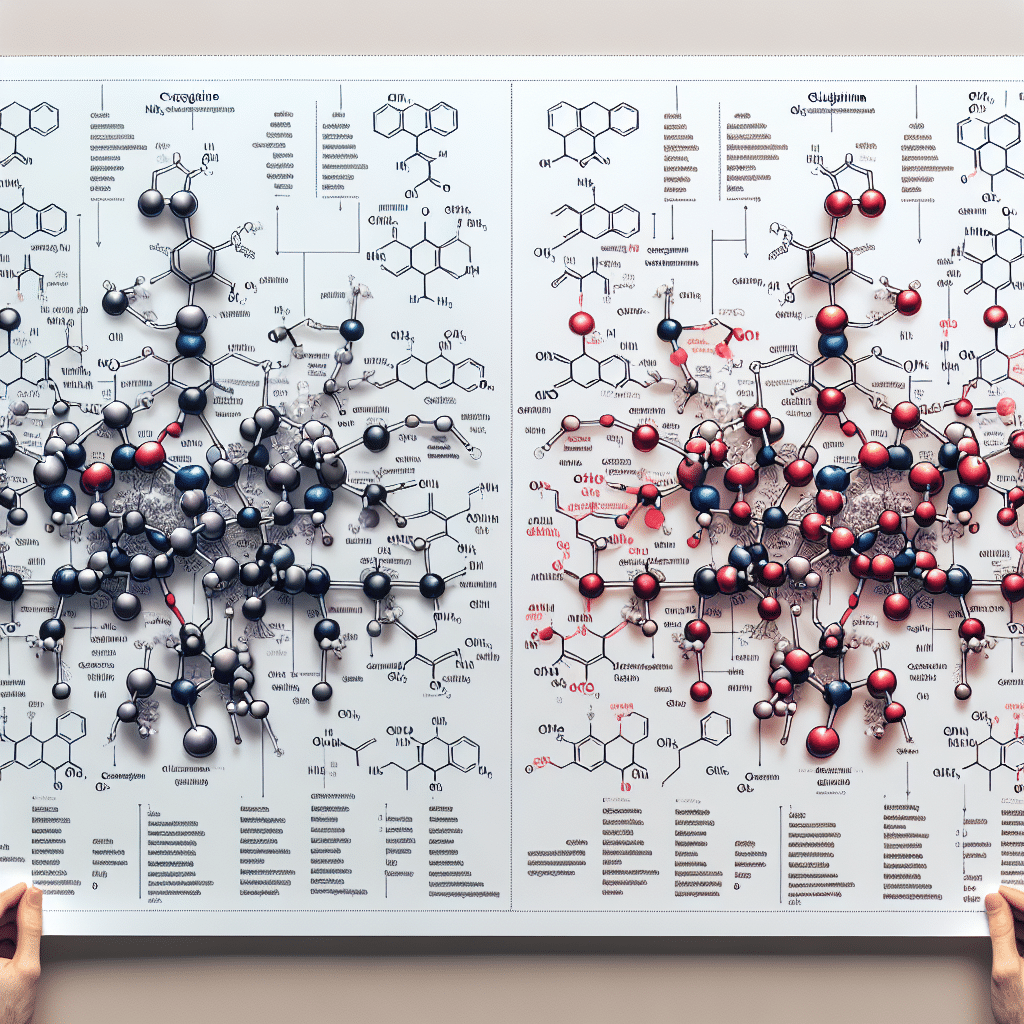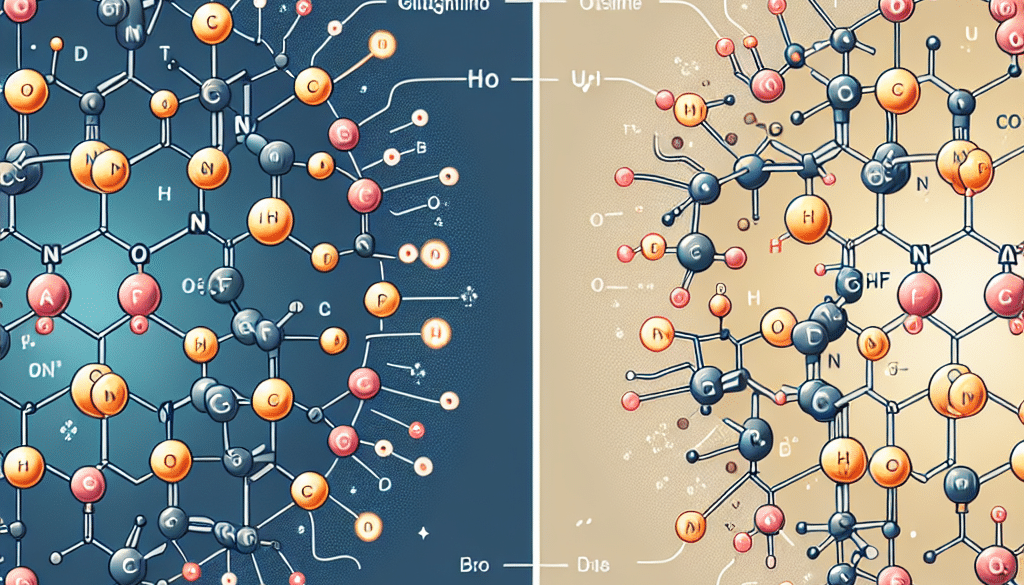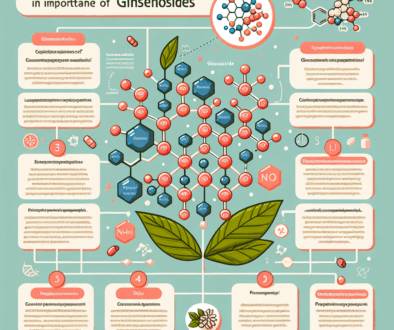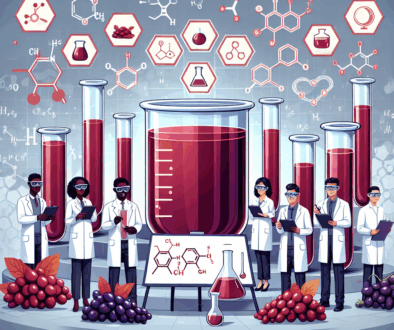N-Acetyle Cysteine vs Glutathione: Comparison
-
Table of Contents
- N-Acetyl Cysteine vs Glutathione: In-Depth Comparison and Benefits
- Introduction to N-Acetyl Cysteine (NAC)
- Understanding Glutathione
- Comparing NAC and Glutathione
- 1. Bioavailability and Absorption
- 2. Antioxidant Properties
- 3. Clinical Applications
- 4. Side Effects and Safety
- Benefits of NAC and Glutathione
- Benefits of NAC:
- Benefits of Glutathione:
- Case Studies and Research
- Conclusion: Key Takeaways
- Enhance Your Health with ETprotein’s Protein Products
N-Acetyl Cysteine vs Glutathione: In-Depth Comparison and Benefits

Understanding the roles of N-Acetyl Cysteine (NAC) and Glutathione in the body is crucial for anyone interested in optimizing their health and well-being. Both are powerful antioxidants with unique properties and functions. This article will delve into the science behind these compounds, compare their benefits, and explore how they work individually and together to support overall health.
Introduction to N-Acetyl Cysteine (NAC)
N-Acetyl Cysteine, commonly known as NAC, is a modified form of the amino acid cysteine. It has gained popularity as a dietary supplement due to its ability to replenish levels of the antioxidant glutathione in the body. NAC is also recognized for its mucolytic properties, helping to break down mucus in the respiratory system.
Understanding Glutathione
Glutathione is often referred to as the “master antioxidant” due to its critical role in protecting cells from oxidative stress and maintaining the immune system. It is a tripeptide composed of three amino acids: cysteine, glutamate, and glycine. Glutathione is produced naturally in the body and is present in every cell.
Comparing NAC and Glutathione
While NAC and glutathione are closely related, they have distinct differences in terms of bioavailability, function, and therapeutic uses. Here’s a closer look at how they compare:
1. Bioavailability and Absorption
One of the primary differences between NAC and glutathione lies in their bioavailability. NAC, being a smaller molecule, is more easily absorbed when taken orally. Once inside the body, it acts as a precursor to glutathione, helping to boost its production. Glutathione supplements, on the other hand, are not as readily absorbed due to the molecule’s larger size and complexity.
2. Antioxidant Properties
Both NAC and glutathione serve as antioxidants, but glutathione is the more potent of the two within cells. It directly neutralizes free radicals and helps regenerate other antioxidants, such as vitamins C and E. NAC’s antioxidant role is primarily through its capacity to increase glutathione levels.
3. Clinical Applications
NAC has been used in clinical settings for its mucolytic properties and to treat acetaminophen (Tylenol) overdose, which depletes glutathione stores. Glutathione is used in cases of severe oxidative stress and certain genetic disorders affecting glutathione metabolism.
4. Side Effects and Safety
Both NAC and glutathione are considered safe for most people when used appropriately. However, NAC can cause gastrointestinal discomfort, rash, or headache in some individuals. Glutathione is generally well-tolerated, though some may experience mild side effects such as bloating or allergic reactions.
Benefits of NAC and Glutathione
Both NAC and glutathione offer a range of health benefits. Here are some of the key advantages of each:
Benefits of NAC:
- Boosts Glutathione Levels: NAC is a precursor to glutathione, helping to maintain adequate levels of this vital antioxidant.
- Supports Respiratory Health: Its mucolytic effect aids in clearing mucus from the lungs, beneficial for conditions like chronic bronchitis and cystic fibrosis.
- Detoxification: NAC helps detoxify harmful substances, such as heavy metals and environmental toxins.
- Psychiatric Disorders: Emerging research suggests NAC may have therapeutic potential in treating mood disorders, addiction, and compulsive behaviors.
Benefits of Glutathione:
- Cellular Protection: Glutathione shields cells from oxidative damage, which can lead to aging and disease.
- Immune System Support: It plays a crucial role in immune function and can help fight off infections and illnesses.
- Anti-Aging: By reducing oxidative stress, glutathione can help slow the aging process and improve skin health.
- Detoxification: Glutathione is essential for the detoxification of harmful substances in the liver.
Case Studies and Research
Several studies have highlighted the effectiveness of NAC and glutathione in various health contexts. For instance, research has shown that NAC supplementation can reduce the severity and frequency of flare-ups in chronic obstructive pulmonary disease (COPD). Similarly, glutathione has been studied for its potential to improve symptoms of Parkinson’s disease due to its neuroprotective properties.
Conclusion: Key Takeaways
In summary, NAC and glutathione are both vital to maintaining health and preventing disease. NAC serves as a precursor to glutathione and has unique benefits, particularly for respiratory health and detoxification. Glutathione is the more potent intracellular antioxidant, essential for cellular protection, immune support, and anti-aging. While they have different roles and properties, both are important for optimal health.
Enhance Your Health with ETprotein’s Protein Products
If you’re looking to support your health further, consider ETprotein’s range of high-quality protein products. Their offerings, including organic rice protein, pea protein, and various seed proteins, provide excellent nutrition and can complement your antioxidant regimen with NAC and glutathione. ETprotein’s products are non-GMO, allergen-free, and come with a guarantee of purity and quality, making them a great choice for anyone looking to boost their health and wellness.
About ETprotein:
ETprotein, a reputable protein and L-(+)-Ergothioneine (EGT) Chinese factory manufacturer and supplier, is renowned for producing, stocking, exporting, and delivering the highest quality organic bulk vegan proteins and L-(+)-Ergothioneine. They include Organic rice protein, clear rice protein, pea protein, clear pea protein, watermelon seed protein, pumpkin seed protein, sunflower seed protein, mung bean protein, peanut protein, and L-(+)-Ergothioneine EGT Pharmaceutical grade, L-(+)-Ergothioneine EGT food grade, L-(+)-Ergothioneine EGT cosmetic grade, L-(+)-Ergothioneine EGT reference grade and L-(+)-Ergothioneine EGT standard. Their offerings, characterized by a neutral taste, non-GMO, allergen-free attributes, with L-(+)-Ergothioneine purity over 98%, 99%, cater to a diverse range of industries. They serve nutraceutical, pharmaceutical, cosmeceutical, veterinary, as well as food and beverage finished product distributors, traders, and manufacturers across Europe, USA, Canada, Australia, Thailand, Japan, Korea, Brazil, and Chile, among others.
ETprotein specialization includes exporting and delivering tailor-made protein powder and finished nutritional supplements. Their extensive product range covers sectors like Food and Beverage, Sports Nutrition, Weight Management, Dietary Supplements, Health and Wellness Products, and Infant Formula, ensuring comprehensive solutions to meet all your protein needs.
As a trusted company by leading global food and beverage brands and Fortune 500 companies, ETprotein reinforces China’s reputation in the global arena. For more information or to sample their products, please contact them and email sales(at)ETprotein.com today.












